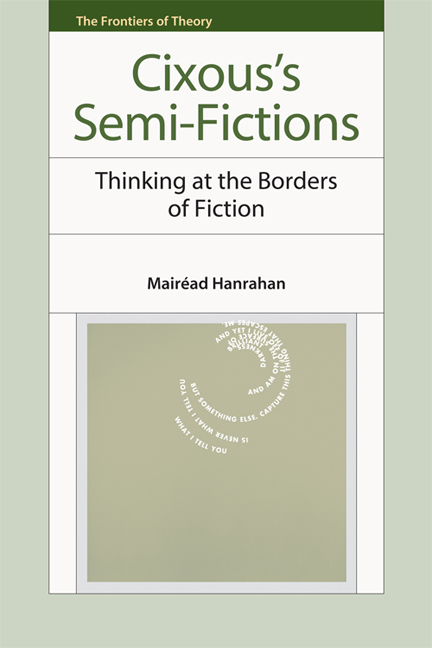Book contents
6 - The Time of Hospitality: Les Rêveries de la femme sauvage
Published online by Cambridge University Press: 05 August 2016
Summary
Over the last ten years or so, the idea has gained currency of a periodisation of Cixous's œuvre. For example, Elissa Marder precedes her analysis of Cixous's transformative play on her family's ‘given names’ with the postulation that during the decade following 1991, ‘Cixous's writing takes a marked and distinctive turn. A different turn inwards and outwards from what comes before. The texts that she writes during these years take the form of an “auto-analysis” or even an “auto-odyssey”.’ Claire Boyle sees a ‘new autobiographical cycle’ begin in 2000 with a more explicit investigation of Cixous's past. More recently, a call for proposals for a volume to be edited by Elizabeth Berglund Hall, Eilene Hoft-March and Maribel Peñalver Vicea on ‘Cixous since 2000’ aims ‘to reveal some of the dominant themes of her contemporary work, and to discern the ways in which Cixous's most recent writings differ – or not – from her earlier texts’. As the parenthetical ‘or not’ here patently reveals, the notion of a secure periodisation of Cixous's work proves problematical even as the idea emerges. These various periodisations are predicated on significantly differing identifications of a turning point in Cixous's work: 1991 in one case, 2000 in the others. Les Rêveries de la femme sauvage [Reveries of the Wild Woman], the book that will be the focus of reading in this chapter, is the only text that belongs to both these attempts to outline a temporal shift in Cixous's output; published in 2000, it is situated at the beginning of a distinct time period in one case, and towards the end of one in the other. Marder's choice of 1991 as a decisive moment of change in Cixous's work is all the more intriguing given that Or: Les letters de mon père [Or: My Father's Letters] and Osnabrück, the other two texts which she places, along with Les Rêveries, ‘at the heart of this auto-odyssey’, were similarly written towards the end of the 1990s, whereas other fictions Cixous published between 1991 and 1996 do not figure in her argument.
- Type
- Chapter
- Information
- Cixous's Semi-FictionsThinking at the Borders of Fiction, pp. 157 - 184Publisher: Edinburgh University PressPrint publication year: 2014



